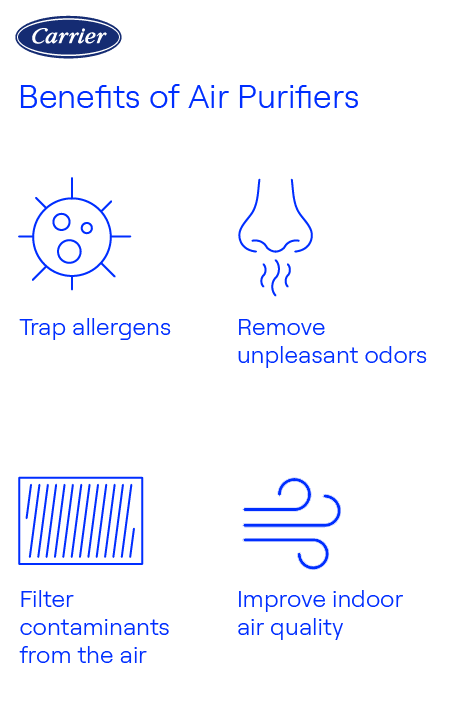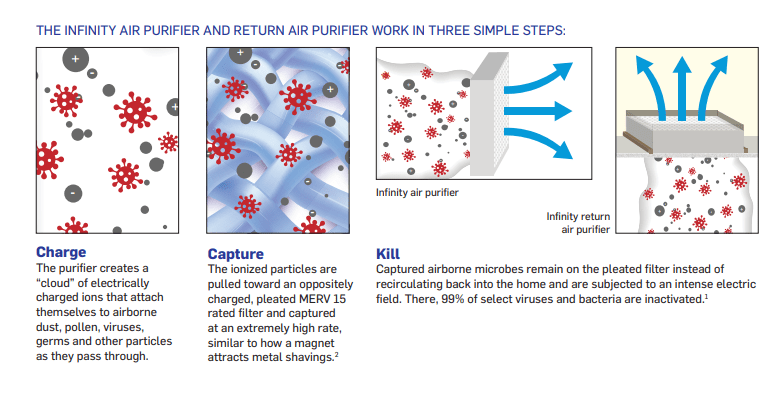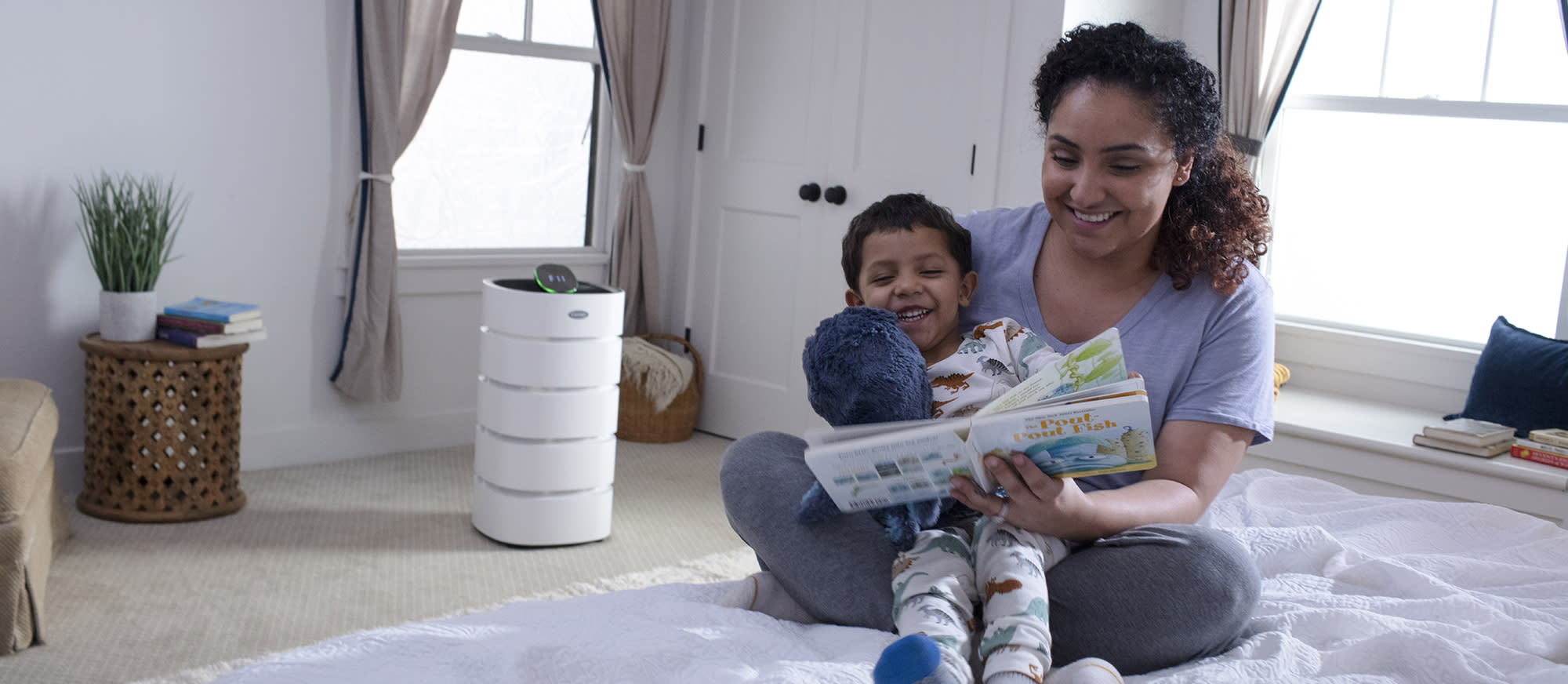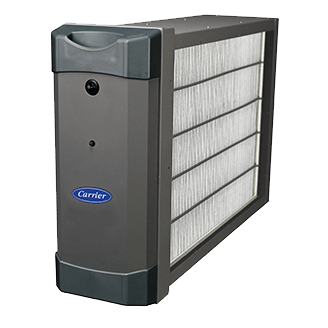Four Air Purifier Benefits
What is the Purpose of Air Purifiers?
An air purifiers purpose is to capture airborne pollutants, allowing cleaner air to circulate back into your living areas.
According to the EPA Americans spend, on average, about 90% of their time inside.1 While passing the time in an indoor environment might sound ideal, it can actually be the opposite. That’s because the concentration of pollutants inside the home can be higher than it is outside -- by a factor of 2-5 times.1 Those numbers are the result of energy-efficient home construction combined with increased use of synthetic building materials, harsh cleaning chemicals, personal care products, pesticides and more. In addition, mold spores, pet dander, dust mites, combustion byproducts and other sources of indoor air pollution are circulated from room to room via forced air systems that, ironically, are designed to make you comfortable. The good news is your HVAC system can also be the key to clearing the air when it includes an air purifier or high efficiency filtration. And, that’s why more and more homeowners are investigating allergen air purifier benefits.
Four Benefits of Air Purifiers

The answer to the question, “what are air purifiers used for?” varies. For some, it’s just a way to keep your home cleaner and more dust-free. For others, it’s a matter of capturing and eliminating airborne particles that can trigger allergies and asthma. And don’t forget the benefits to your HVAC system – air purifiers can reduce the buildup of dirt and debris inside your HVAC system to help keep it operating at its best. Regardless of your motivation, the goal is to match an air purifier with the air quality needs of the home.
“A whole-home air purifier can help reduce a wide range of indoor air pollutants, including VOCs, dust, pet dander, mold, viruses, and odors,” Kevin Dickson, president of Energy Services Air Conditioning, Heating and Electrical in Naperville, Illinois, said. “By removing these contaminants, it not only improves overall air quality but also supports the health of everyone in the home, especially children, seniors, or anyone with allergies or respiratory issues. Many homeowners also notice increased comfort and a fresher-smelling home. Choosing the right system for your home ensures it works efficiently with your HVAC system and provides consistent protection throughout every room.”

1. Trap Allergens Like Dust Mites, Pollen & Pet Dander
HEPA filters are very effective at trapping very small particles in the air. However, larger pollutants like dust mites, pollen and pet dander can all be trapped by basic 1-inch filters, pleated filters and even some of the pre filters used in high-efficiency air purifiers. This level of filtration can help reduce build-up of dust and dirt in your home and can also reduce the amount of allergy-triggering matter in indoor air. According to the American College of Allergy, Asthma and Immunology, air filtration has shown an ability to reduce airborne allergens.5 HEPA filters capture 99.97% of particles sized 0.3 microns, including dust, pollen, and other airborne particles.5 Learn more about do air purifiers help with dust and allergies.
2. Remove Unpleasant Odors
Standard air filters, including HEPA filters, are great at trapping airborne particles. However, if you are concerned about odors, activated carbon filters are what you need. Activated carbon filters incorporate a carbon source, such as coconut shells, wood, or coal which are “activated” through a specific heating process. Once activated, the carbon material contains a series of pores which can trap odor-causing volatile organic compounds (VOCs) from building materials like caulk, paint, adhesives and carpeting.2 They can also help capture odors from tobacco smoke, pets and other household sources. Once they are “full”, activated carbon filters will no longer control odors and must be replaced. As a part of their three-step filtration process, Carrier room air purifiers include an activated carbon filter for odor control. For a whole home solution, Carrier offers the Carbon Air Purifier with UV light that includes a carbon filter that aids in the reduction of gases, including ozone, in recirculated air.
3. Prevent Airborne Diseases By Filtering Contaminants from the Air
Many filters, both whole-home and portable, can trap common household allergens, bacteria and even some viruses. For even greater protection, look for a system that can also make them inactive, like the Carrier Infinity air purifier. Using our patented Captures & Kills technology, a Carrier Infinity air purifier traps 95% of particles in micron size range 1.0 to 3.0 flowing through your HVAC system3 and subjects them to an intense electric field. This technology inactivates 99% of select airborne germs and viruses trapped in the MERV 15 filter including coronavirus, human influenza, the common cold and bacteria that causes strep throat.4
For more information about how air purifiers work, check out our Do Air Purifiers Work? page.
4. Improve Indoor Air Quality
Adding an air purifier to your home is a great first step towards improving the quality of the air inside your home. To maximize the benefits provided by your air purifier, proper maintenance, including replacing filters is extremely important. According to the American Lung Association, poor indoor air quality can contribute to infections, chronic lung diseases like asthma, and even lung cancer.6 For those already suffering from lung disease, the risk is even greater.
Carrier Air Purifiers for Healthier Homes
Air purifiers can help remove airborne particles like dust, pollen, pet dander and other pollutants known to cause allergies, creating a healthier home environment.
Carrier offers several air purifiers, including our Infinity® Air Purifier with Captures & Kills® technology for whole-home filtration.
Air purifiers such as the Infinity Air Purifier also have the capability of inactivating select airborne germs and viruses trapped in the filter, preventing those harmful particles from being circulated back into the air you breathe. As you consider the many reasons for an air purifier, be sure to take a look at the Carrier products for your home, our smart room air purifiers
Adding an air purifier to your home is a great first step towards improving the quality of the air inside your home. To maximize the benefits provided by your air purifier, proper maintenance, including replacing filters is extremely important.

Are Air Purifiers Worth It?

Connect With A Carrier Dealer On Air Purifier Benefits
For more information and an estimate on how a Carrier air purifier can improve the air in your home, contact your local Carrier indoor comfort expert today or read more about choosing the best air purifier or best air purifier for mold for your home.
Frequently Asked Questions About Benefits of Air Purifiers
Yes, they can be effective at removing airborne pollutants such as dust, pollen, pet dander, and volatile organic compounds (VOCs) from the air. This can help reduce airborne allergens4 lead to a cleaner indoor environment. This is dependent on the position of the air cleaner, runtime of the system / air cleaner, and overall effectiveness of the system in the home. Results may vary.
While air purifiers offer numerous benefits for indoor air quality, there are a few potential downsides to consider. Air purifiers require ongoing maintenance as filters require regular replacement according to manufacturer recommendations, which adds to operating costs Some air purifiers can produce noise, especially at higher fan speeds, which may be bothersome in quiet environments or during sleep. Running an air purifier continuously can increase electricity usage, though newer models are more energy-efficient.
Yes, using an air purifier every day can be beneficial for maintaining clean indoor air quality consistently. However, it is especially important to run your air cleaner during an event that may lead to reduced indoor air quality such as poor outdoor air conditions (examples: wildfire smoke, pollen season, etc) and/or during a family or social gathering.
Sleeping with an air purifier on can provide can help improve indoor air quality while you sleep. Air purifiers filter airborne pollutants such as dust, pollen, and pet dander.
Sources
1https://www.epa.gov/report-environment/indoor-air-quality
2https://epa.ohio.gov/portals/27/engineer/eguides/carbon.pdf
3Based on third-party testing (2012) showing 95% of particles size 1.0 to 3.0 microns captured and 85% of particles size 0.3 to 1.0 microns captured.
4The Infinity air purifier has demonstrated effectiveness against the murine coronavirus, based on third-party testing (2020) showing a >99% inactivation, which is a virus similar to the human novel coronavirus (SARS-CoV-2) that causes COVID-19. Therefore, the Infinity air purifier can be expected to be effective against SARS-CoV-2 when used in accordance with its directions for use. Third-party testing (2012, 2007) also shows =99% inactivation for the type of virus that causes common colds, Streptococcus pyogenes and human influenza. Airborne particles must flow through your HVAC system and be trapped by the MERV 15 Infinity filter to be inactivated at 99%. The Infinity air purifier achieves a MERV 15 rating based on third-party testing (2012) showing 95% of particles size 1.0 to 3.0 microns captured and 85% of particles size 0.3 to 1.0 microns captured.
5https://acaai.org/allergies/management-treatment/living-with-allergies/air-filters/
6https://www.lung.org/clean-air/at-home/indoor-air-pollutants





